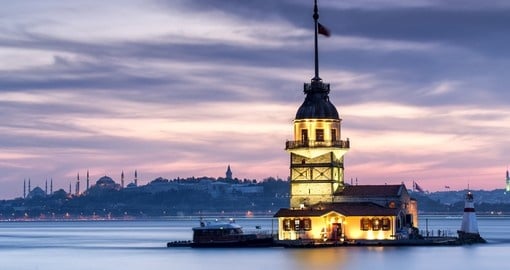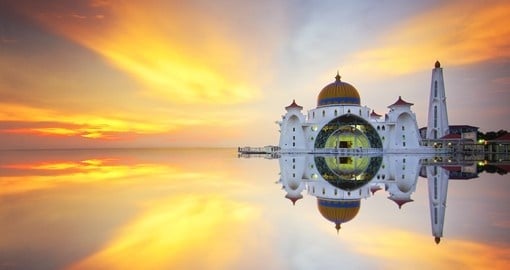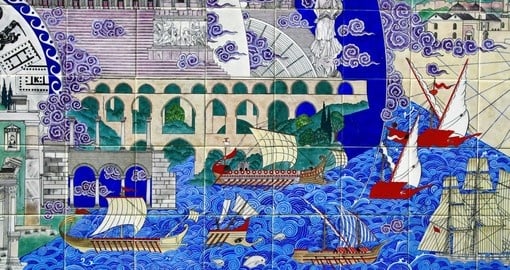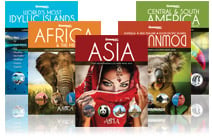Turkey History
Turkey has one of the richest and most interesting histories in the world. A cultural melting pot with a unique location, literally a bridge between Europe and Asia, Turkey has witnessed people moving to and from for many centuries. During the first millennium BC, Greek influence began to spread through Anatolia. The Persians invaded in 547 BC and were successful in culling Greek expansion, effectively ending the remaining home-grown Anatolian kingdoms.
Persian rule lasted until 334 BC when Alexander the Great and his Macedonian army arrived in Anatolia. Alexander continued through Persia, conquering the entire known world. Unfortunately, he left no heir and upon his death in 323 BC, the empire he had formed was divided amongst his generals. Various short-lived kingdoms were created and Rome began to cast an eye on the region, becoming the next prominent figure in Turkish history, introducing Christianity to the country.
As time passed, the Roman Empire became overstretched and was unable to continue further expansion. The Arabs arrived in the 7th century, bringing a new language, civilization and religion – Islam. In 1300, a Turkish bey, Osman, established the Ottoman Empire. The Ottomans became an amalgamation of Greek and Turkish, Muslim and Christian elements. The Ottomans experienced a golden age under Süleyman (1520-66), unfortunately, the sultans that followed paled in comparison and could not match Süleyman’s success. Also, the military that had aided in the expansion of the empire for over 250 years began to tire. The end of the 17th century saw the empire in decline, forfeiting territory and falling behind the West.
Nationalism was very much a foreign concept to the Ottoman Empire, which encouraged the coexistence of various peoples and cultures. Yet after witnessing the creation of nation-states in Western Europe, the desire to embrace individual cultures, thus throwing off the “Ottoman yoke”, began to spread. Independence was granted to Greece in 1830 and to Romania, Montenegro, Serbia and Bosnia in 1878.
The first Balkan War was disastrous for the empire, losing both Macedonia and Bulgaria, with troops fast approaching Istanbul. The Ottoman Empire was nicknamed the “sick man of Europe”. Choosing to support the wrong side during the First World War forced Turkey to defend its territory on multiple fronts and as a result, the empire was essentially dismembered after the war.
After a further conflict with the Greeks, a treaty in 1923 saw foreign powers leave Turkey and modern borders were established. The country was very poor and looked to Mustafa Kemel in his new role as president. He wanted to create a united country in a bid to avoid the separatist movements that had destroyed the country. Unfortunately, he ignored the cultural existence of the Kurds. This resulted in Kurdish revolts, the first of several that would happen in the 20th century.
The 1920s and 1930s were periods of reform that brought Turkey in line with the West rather than the Middle East. Turkey remained neutral during the Second World War and became a US ally. Elections in 1983 saw Turgut Ozal come to power, bringing important economic and legal reforms. During the Gulf War, Turkey played a prominent role in the Allied invasion of Iraq, cementing its place in the international community. The end of the war helped to shine a media light on the plight of the Kurdish people.
The new millennium was a time of great hope for the country. In 2002, the Justice and Development Party won the election and leader Recep Tayyip Erdogan was intent on gaining entry into the European Union. The constitution was amended and greater cultural rights were granted to the Kurdish people. During the past decade, Turkey has undertaken many reforms in a bid to strengthen its democracy and economy.
Today, Turkey boasts a strong economy and tourism is one of the most dynamic and fastest growing sectors in the country. It is estimated that more than 31.5 million people visited Turkey in 2011, making it the sixth most popular tourist destination in the world. It now competes with Greece, Italy and Spain as tourists come from around the world to experience a thoroughly modern country that appreciates and celebrates its rich and diverse history and heritage.
Turkey Travel Information
At Goway we believe that a well-informed traveller is a safer traveller. With this in mind, we have compiled an easy-to-navigate travel information section dedicated to Turkey.
Learn about the history and culture of Turkey, the must-try food and drink, and what to pack in your suitcase. Read about Turkey's nature and wildlife, weather and geography, along with 'Country Quickfacts' compiled by our travel experts. Our globetrotting tips, as well as our visa and health information, will help ensure you're properly prepared for a safe and enjoyable trip. The only way you could possibly learn more is by embarking on your journey and discovering Turkey for yourself. Start exploring… book one of our Turkey tours today!
Book your Turkey tour with Goway!
 AfricaExperts is the exclusive division of Goway that specializes in planning and organizing Turkey tours and experiences. Choose from a simple city stopover, a locally escorted tour, see the country highlights on one of our classic itineraries, a small group tour and more. We want to be your first choice when next you go globetrotting to Turkey.
AfricaExperts is the exclusive division of Goway that specializes in planning and organizing Turkey tours and experiences. Choose from a simple city stopover, a locally escorted tour, see the country highlights on one of our classic itineraries, a small group tour and more. We want to be your first choice when next you go globetrotting to Turkey.
Get a Trip Quote Order a Brochure



















